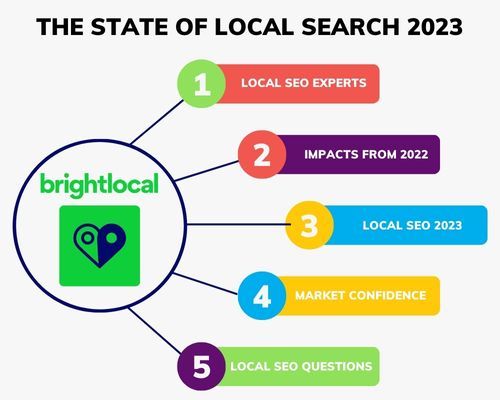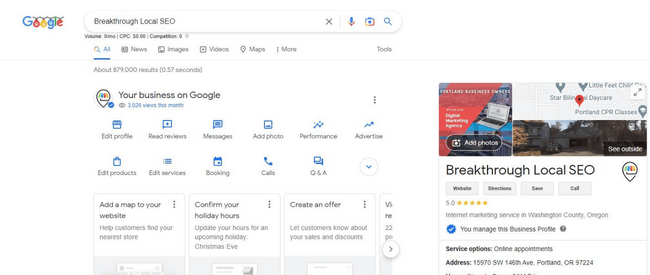Local SEO Keyword Research

Local Search Engine Optimization (SEO) is a crucial part of any contractor's successful digital marketing strategy. But how do contractors use keyword research to maximize the benefits of SEO? What strategies can be adopted for effective and efficient implementation of keyword research in an SEO campaign? Can it really help contractors find success online?
Keyword research plays an important role when it comes to optimizing websites for search engine rankings. It allows marketers to identify which keywords or phrases are being used by their target audience and then develop content that meets those needs. Contractors must understand the process of keyword research if they want to effectively optimize their website's visibility on Google, Bing, Yahoo, etc. In this article, we will discuss the importance of keyword research in SEO for contractors and some best practices when implementing it.
It is essential that contractors understand how to utilize keyword research correctly to make sure their webpages reach their intended audiences and draw their attention.
The right approach ensures greater exposure and higher engagement rates from potential customers – something every contractor wants! With this knowledge at hand, let us dive deeper into understanding what exactly keyword research entails and why it is so critical for achieving success in today’s competitive market.
What Is Keyword Research?
Keyword research is the process of uncovering words and phrases related to a particular topic that is used in search engine queries. It involves researching popular terms, conducting analysis of competitors’ strategies, and analyzing trends in keyword searches over time. The goal of keyword research is to identify potential keywords or topics which are relevant to your specific industry or niche business so that you can optimize your website for these terms and ultimately increase organic web traffic.
The importance of keyword research lies in understanding what users are searching for when they utilize search engines like Google, Yahoo!, Bing, and other similar services. Keywords provide insight into user intent and help ensure content on websites matches their needs; thus, increasing visibility of the site within search results. Additionally, targeted keywords allow marketers to craft strategic campaigns with higher chances of success due to increased relevance towards target audiences.
By incorporating focused keywords throughout content marketing efforts such as blogs, press releases, articles, website copy, advertisements – Contractors can effectively reach their desired audience through SEO tactics, leading to an overall better online presence for their businesses as well as improved lead conversions.
Why Is Keyword Research Important For SEO?
Keyword research is an essential aspect of any successful Search Engine Optimization (SEO) campaign. It helps marketers identify target phrases, which can be used to optimize content and increase website visibility in organic search results. In this article, we will explore why keyword research is important for SEO, as well as how it can improve a contractor's online presence.
The first step of any effective SEO campaign is identifying the right keywords and phrases that potential customers are using when searching for services provided by contractors. Keywords help inform the structure of websites; they should be included in titles, headings, and body copy so that they appear prominently on search engine result pages (SERPs). With the correct implementation of relevant keywords onto webpages, these pages have a better chance at ranking high on SERPs, thereby increasing their visibility, and driving more traffic to your site.
Additionally, keyword research provides valuable insight into customer behavior such as language preferences or trends over time. This data allows you to tailor your messaging accurately based on what people are actually typing into the search bar and can uncover new opportunities for growth within specific markets or niches. By understanding user intent behind certain queries, you may even discover related topics not previously considered - expanding your reach to untapped audiences while still providing value through content tailored specifically towards them.
Through careful monitoring of key metrics like click-through rate (CTR), bounce rate, and conversion rate, businesses can then further refine their strategies according to consumer response and maximize ROI from their efforts. Ultimately, having access to quality data empowers companies with information needed to make informed decisions regarding their marketing campaigns - enabling them to stay ahead of competitors and remain competitive in today's digital landscape.
By leveraging the power of keyword research effectively in SEO campaigns geared towards contractors, businesses can gain greater insights into consumer needs and behaviors, which subsequently leads to improved rankings on SERPs as well as increased engagement from targeted users. As such, it is crucial that contractors understand the importance of utilizing this powerful tool for optimized success online.
How Does Keyword Research Improve SEO?
Keyword research is an essential part of SEO as it can help website owners create content and build links that are more likely to rank on search engine results pages. According to a survey by Ahrefs, “90.63% of all content gets no traffic from Google”. This statistic alone emphasizes the importance of keyword research in improving SEO rankings.
When it comes to keyword research for contractors, there are several types of keywords they should consider including:
Short-tail keywords which have high competition but provide more targeted leads.
- Long-tail keywords which have higher competition but also lower search volumes.
- Localized terms such as city or region related keywords.
- Industry specific terms like 'construction contractor' or 'electrical services'.
Having knowledge about different types of keywords allows contractors to better optimize their websites for search engines, enabling them to reach potential customers who might be searching for their services online. Additionally, understanding how these groups of words interact with each other can provide insight into what works best when crafting content and building links. Knowing how people search for things online helps contractors tailor their messaging so that it resonates with their target audience. With the right keyword strategy, contractors will be able to increase visibility and attract more qualified prospects, resulting in improved ROI.
By researching relevant topics within their industry, contractors can identify opportunities where they may have previously overlooked and capitalize on those areas as well as stay up-to-date on current trends that could impact their business down the line. Researching competitors’ strategies also gives valuable information about what has worked or not worked in the past allowing them to gain an edge over competing businesses in the same field. Ultimately, doing thorough keyword research provides useful insights that enable businesses to make data-driven decisions regarding optimizing content for SEO purposes as well as creating marketing campaigns tailored towards reaching out directly to prospective clients.
Types Of Keywords To Consider For Contractors
The success of a contractor's website depends on the strength and accuracy of their keyword research. Allusions of a knight gearing up for battle comes to mind; only by understanding what your target audience is searching for, can you arm yourself with the right tools for an SEO victory. In this section we'll cover types of keywords contractors should consider when conducting keyword research to improve SEO performance.
When creating content related to contracting services, there are two main categories of keywords that should be considered: short-tail and long-tail. Short-tail keywords consist of one or two words in length, such as ‘contractor’ or ‘kitchen remodeler’, while long-tail keywords include three or more words like ‘affordable kitchen remodeling service near me'.
Both have their own advantages. Short-tails generally produce higher search volumes but usually feature greater competition due to their popularity. Long-tails may not generate much traffic initially, but they represent an opportunity to create specialized content targeting niche audiences which can drive organic leads over time. Here are some examples:
Short tail keywords:
- Contractor
- Remodeling
Long tail keywords:
- Affordable bathroom tiling service near me
- Commercial drywall repair experts in Portland
It is important for contractors to understand how each type of keyword could be beneficial in different contexts and factor them into their content strategy accordingly. Taking advantage of both short and long tails will help ensure maximum visibility across various topics within their industry so that customers find exactly what they need when looking for it online.
Analyzing Keyword Search Volume & Competitiveness
Analyzing the search volume and competitiveness of keywords is a crucial step in effective keyword research for contractors. Like a chess player methodically studying their opponent's moves, it requires careful consideration to determine which keywords will yield the best results. The challenge lies in discerning between potentially lucrative terms with high competition and low-hanging fruit that may not have as much potential but require less effort to rank for them.
By examining search volumes, SEO experts can identify how often users are searching for specific phrases or topics related to contractors. Examining competitive metrics provides insight into how difficult it would be to outrank competitors already appearing on SERPs (Search Engine Result Pages). With this knowledge, Local SEO experts can develop a plan of attack strategically targeting keywords most likely to increase organic traffic and conversions.
Combined with other factors such as cost-per-click pricing, seasonality trends, and user intent, analyzing keyword search volume and competitiveness helps create an informed picture of what works best when targeting prospects online for construction related industries through SEO Services. A comprehensive keyword list crafted from this data sets the stage for successful marketing campaigns built around relevant content tailored specifically to resonate with target audiences.

Crafting A Comprehensive Keyword List
Crafting a comprehensive keyword list is like piecing together the perfect puzzle. It takes patience, careful thought, and attention to detail to maximize your return. To ensure contractors have an effective SEO strategy, here are three essential steps to help create a complete keyword list:
- Analyze search volume: Knowing the number of searches for each term will indicate how much competition there is for that particular word or phrase. This can provide insight into which keywords should be used in content creation and where more effort needs to be focused on optimizing it for search engine results pages (SERPs).
- Assess competitiveness: Look at current SERP rankings of competitors’ websites and analyze their backlinks, quality scores and click-through rates (CTRs). By doing this you can determine if your website has similar potential compared to theirs. If not, then focus on improving the quality of links pointing towards your site as well as other factors such as page loading speed and mobile optimization.
- Brainstorm ideas: Use online tools such as Google Trends or KWFinder to generate additional keyword phrases related to contractor services. Consider adding ‘long tail’ terms - these are longer phrases typically containing 3+ words that often result in higher conversion rates when optimized properly due to being less competitive than shorter versions of them.
Additionally, think outside the box by researching synonyms, variations or combinations of existing terms – all of which could open up new opportunities within niche markets.
By taking time upfront to carefully craft a comprehensive keyword list with consideration given to both short and long-tail options based on search volumes & competitor standings – contractors can better position themselves for success with SEO campaigns going forward.
Identifying Long Tail Keywords
Identifying long tail keywords is a key component to keyword research in SEO for contractors. Long tail keywords are queries that contain three or more words and often target users further down the sales funnel, as they tend to be much more specific than other search terms.
These types of keywords can help increase organic traffic by taking advantage of less competitive search engine results pages (SERPs). Additionally, due to their specificity, these sorts of queries have higher conversion rates since they cater to people who already know what they want.
For example, if someone searches “best kitchen faucet” versus “black pullout sprayer kitchen faucet with single handle” - the latter would be considered a long tail keyword due to its length and level of detail. As such, it likely caters to an individual looking for very specific product details instead of just researching different models. With this knowledge in mind, contractors can use keyword research tools to identify potential opportunities within their niche and craft content specifically tailored towards them.
Utilizing Keyword Research Tools
When it comes to optimizing pages for SEO, keyword research is a key component. Utilizing the right keyword research tools can be instrumental in helping contractors identify lucrative long tail keywords that will drive organic traffic and improve visibility on search engine results pages (SERPs).
There are several different types of keyword research tools available to contractors today with varying levels of complexity and cost. Here are four essential ones:
- Google Keyword Planner – This free tool from Google allows users to get ideas related to relevant topics and find estimated monthly searches associated with certain terms or phrases.
- Moz Pro Tools – These professional-level tools allow users to conduct detailed market analysis, track rankings over time, analyze link profiles and more.
- Keywords Everywhere – An extension for Chrome or Firefox browsers which provides a variety of data points, such as monthly search volume, cost per click (CPC), competition level and more.
- UberSuggest – A free online tool that offers suggestions based on what you type into the interface, including words, phrases and questions people are likely searching for.
Knowing how to use these keyword research tools properly can help contractors hone their content strategy and target specific audiences while increasing their website’s visibility in SERP's effectively.
Understanding not only what niche keywords your potential audience might be using but also understanding the context around those queries is paramount when crafting content pieces that have staying power across multiple channels. With this knowledge at hand, contractors have all the information necessary for creating an effective optimization plan for their business objectives.
Transitioning from utilizing keyword research tools to optimizing pages with keywords should now be easier due to having taken advantage of the insight gleaned from researching higher quality long tail keywords via appropriate resources previously mentioned here today.

Optimizing Pages with Keywords
Optimizing pages with keywords is a critical step in keyword research for SEO. It involves finding the most relevant phrases that can be used to target potential customers and generate more traffic to your website. This process requires an understanding of search engine algorithms, such as Google’s PageRank an algorithm which ranks webpages based on their relevance to certain topics. Additionally, knowing how to use various tools like Keyword Planner and SEMrush can help you identify popular terms related to the services offered by contractors.
Once you have identified these relevant keyphrases, it's important to incorporate them into content across all areas of the contractor's website. For example, titles, headings, introductions, body copy and meta descriptions should include these terms naturally throughout the text. By using keywords strategically within the site's structure and design, contractors are better able to attract organic users from search engines who may potentially become paying customers.
It is also essential for contractors to continually update their page optimization strategies depending on changes in market trends or shifts in user search behavior. After making adjustments to meet changing needs, monitoring changes in search rankings becomes paramount so that any necessary modifications can be made quickly and effectively.
Monitoring Changes in Search Rankings
Monitoring changes in search rankings can be likened to a game of chess; one must stay abreast of the competition, anticipate their moves, and quickly adapt strategies accordingly. For contractors looking to make use of keyword research for effective SEO, keeping track of search engine performance is an essential component.
From tracking specific keywords to analyzing overall trends, monitoring search ranking fluctuations helps create more informed decisions on where to focus efforts. Through observation, it becomes possible to identify which approaches are working as intended and what adjustments may be necessary. Should results not meet expectations, this data allows for timely course corrections that will maximize the chances of success.
Such ongoing analysis also reveals insights into user behavior which can be used to refine content strategy going forward. A holistic perspective incorporating both context and intent along with other relevant factors like location or device type provides valuable input into how best to shape the message being conveyed through SEO optimization efforts. With an understanding of all these elements at hand, businesses can craft solutions tailored specifically towards achieving desired outcomes without losing sight of long-term objectives.
Analyzing Competitors’ Keywords
As the adage goes, “Knowledge is power” - and one of the most powerful pieces of knowledge to acquire in Local SEO for contractors is an understanding of their competitors’ keywords. To gain this insight, they must analyze those same terms that other players in the market are using. This can be done through extensive keyword research and tracking how these words are used by others throughout their content.
The modern search engine optimization landscape has shifted away from simply monitoring changes in search rankings to a much more holistic approach. Contractors now need to develop insights into what audiences want when searching online and how they interact with websites. Knowing which keywords competitors are targeting allows them to understand what topics potential customers may have already searched for. By leveraging this information, contractors will be able to prioritize certain phrases over others depending on various factors like competition level or traffic volume.
A sound SEO strategy requires use of both primary (targeted) and secondary (competitive) keywords. Analyzing competitor's keywords provides valuable data about where the focus should lie for maximum results, as well as gives insight into trends within specific target markets. It also affords access to ideas that could potentially increase organic website traffic down the line if properly implemented and monitored going forward. With such intelligence at hand, it becomes easier to leverage semantic keywords in order to maximize reach across multiple channels while still delivering relevant content that resonates with potential customers.
Leveraging Semantic Keywords
Semantic keywords are essential for effective keyword research in SEO. Semantic keywords refer to words that are related or connected to the main topic being discussed, rather than just using a single word phrase such as “contractor”.
By leveraging semantic keywords, contractors will be able to create content more accurately tailored towards their target audience. This allows them to reach users who may not have been accessible through traditional means of marketing. Additionally, by understanding how people search and what they expect from search results, contractors can effectively optimize their site for better user experience, engagement and conversion rates.
Furthermore, using semantic keywords gives contractors the opportunity to rank higher on SERPs (Search Engine Result Pages) due to its broader scope of coverage compared to other types of keyword phrases. By taking into consideration context and relevancy, these terms bring more value to both organic and paid campaigns since it enables searchers to find exactly what they’re looking for quickly and efficiently. As a result, this helps increase visibility while driving relevant traffic that is likely to convert at a much higher rate than other methods used today.
This comprehensive approach provides insight into why leveraging semantic keywords should be part of any successful contractor's SEO strategy moving forward. Without proper implementation of semantics-based search queries, businesses run the risk of missing out on numerous potential opportunities in terms of reaching new customers online. With that said, understanding how best to leverage semantic keywords during keyword research proves critical if contractors want to achieve success with SEO efforts over time. Transitioning into writing high-quality content for SEO is one way that local contractors can further capitalize on their findings from keyword research utilizing semantically related phrases.
Writing High-Quality Content
The theory that writing high-quality content for Search Engine Optimization (SEO) provides powerful results has been well established. With the right strategy, SEO contractors can use this to make a significant impact on their clients’ websites. Writing quality content is an important part of any successful SEO campaign and should not be overlooked by contractors.
When creating content, it's crucial to understand how search engines work and what they look for in order to rank pages highly. Content must meet certain criteria in terms of technical optimization such as keyword density, length of text and structure; but more importantly, it needs to communicate a message effectively.
Quality content requires engagement with readers and encourages them to take action – whether that means making a purchase or signing up for something. The key is understanding the target audience/reader and crafting relevant messages tailored specifically towards them.
Content should also link back to other pages within the website, either through hyperlinks or internal linking strategies. This helps establish relevance between related topics, increases page views and strengthens authority on a specific subject among readers and search engine algorithms alike. Internal links provide users with additional information which may lead to conversions down the line too. In addition, when done correctly, internal links are beneficial from an SEO perspective because they help pages maintain higher rankings over time while providing valuable context clues about user intent to search engine crawlers.
Using Internal Linking Strategies
How can internal linking strategies help contractors optimize their websites for SEO? To maximize the impact of keyword research, understanding and utilizing proper internal linking practices is an essential part of the SEO strategy. Here are some key elements that contractors should consider when creating effective internal links:
- Utilizing anchor text – using keywords in your link's clickable text allows search engines to understand what the linked page is about.
- Creating logical connections between pages on a website – this will provide users with easy navigation through interlinked topic-specific content.
- Linking back to older posts or archived pages – this helps direct visitors who have already visited your site to more relevant information.
Internal linking provides value both from a user experience standpoint as well as for SEO purposes.
It creates an environment where users can easily find related topics covered by the same website, keeps them engaged within the website’s ecosystem, and encourages further exploration into other areas of content.
Additionally, it helps search engine crawlers move quickly throughout the site while indexing its various pages, which can affect ranking performance. By optimizing these types of outbound links, contractors have the opportunity to increase visibility and get targeted organic traffic, across multiple webpages. Understanding how to use internal links effectively is critical for achieving sustainable results in SEO efforts.
Measuring The Effectiveness of Keyword Research
Achieving success in SEO for local businesses involves a deep understanding of keyword research and measuring the effectiveness of these efforts is essential. To start as if going down a well-worn path, keyword research is akin to navigating an ever-changing landscape; it can be difficult to accurately assess progress without accurate metrics. When done correctly, this process yields valuable insights about what customers are looking for when they search online.
When conducting keyword research for SEO purposes, there are several key indicators that should be tracked and assessed on an ongoing basis. These include click-through rate (CTR), average position score (APS) and cost per click (CPC).
- CTR measures how often users select your website link when presented with multiple options, while
- APS looks at where you appear in SERPs relative to competitors.
- CPC helps determine which keywords bring higher returns on investment.
Each of these data points provide unique insight into the overall performance of keyword research campaigns and enable more strategic decisions based on hard evidence rather than guesswork or speculation.
By taking such an analytical approach to keyword research, contractors can gain greater clarity regarding their competitive positioning within the digital landscape over time. This type of monitoring also allows them to quickly respond to changes in consumer preferences or seasonal trends so that marketing strategies remain relevant and effective long after initial implementation. Ultimately, by carefully measuring results from keyword research initiatives, it is possible to refine techniques and maximize ROI regardless of industry or target market size.
Conclusion
Keyword research is an essential component of successful Local SEO strategies for contractors. When done correctly, it can help them reach their target audience more effectively and improve website rankings on search engine results pages.
It involves analyzing keyword search volume, competitiveness, levering semantic keywords, writing high-quality content and using internal linking strategies to ensure maximum visibility for contractor websites. By leveraging these techniques, contractors are able to gain a competitive edge in the market.
Measuring the effectiveness of keyword research is key in determining its success. For example, tracking organic traffic generated from specific keywords can give insight into how effective the strategy was in driving relevant visitors to a website. Additionally, monitoring ranking positions and click through rates will provide data which can be used to refine keyword selection and optimize future campaigns.
Ultimately, keyword research should be seen as an ongoing process that requires consistent testing and refinement if you want to achieve long-term success with your SEO efforts. What steps do you need to take today to make sure your contractor's website remains visible?
If your looking into how you can improve your website rankings, generate more traffic and convert more visitors, this is the place you need to start. Here at Breakthrough Local SEO we can help you create a complete Local SEO Strategy, including a comprehensive KW Research Report. As part of our Local SEO Services, we offer ongoing Local SEO Services and Ad-Hoc Services as requested.
Contact Us to find out more information.
Visit our previous post on Local SEO for Contractors
Ready to work with Breakthrough Local SEO?
Let's connect! We’re here to help.
Send us a message and we’ll be in touch.
Or give us a call today 503-382-8911
Agency Contact Form
We will get back to you as soon as possible
Please try again later


All Rights Reserved | Breakthrough Local SEO




